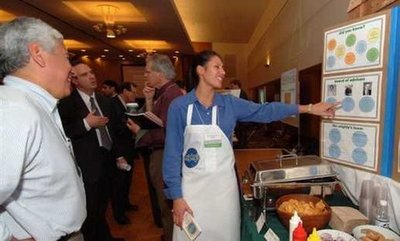May 17, 2005
Taking care of business: Enterprising students vie for seed money, chance to cultivate, grow their ideas
Emerging companies whose goals are to improve medical care technology, encourage healthier lifestyles and introduce the Internet for use in novel ways dominate this year’s group of finalists in the University of Washington’s eighth annual Business Plan Competition.
Four of the 16 teams that have advanced to the finals offer promising advances in science and medicine. Finalists represent Gonzaga University, Seattle Pacific University and the UW. Atheroson Inc., for example, will develop ultrasound technology that would provide instant detection of heart attacks in emergency rooms. The company says its device would be cheaper and quicker than traditional CT and MRI scans that are currently used to diagnose coronary artery disease.
The team, comprised of four UW students studying bioengineering, business and law, has filed a provisional, or temporary, patent through the UW TechTransfer Office. David Dupree, a former emergency room doctor and current master’s of business administration student, is the president and chief executive officer. Dupree says he’s not sure if launching a start-up is tougher than farming was back in his native Louisiana, or riskier than his current job as a day trader.
“In preparing for the finals, we’ll try to address all the risks to possible investors, polish the presentation and be ready for tough questions from the panel,” says Dupree. “Our mindset is one of cautious optimism. We have great technology and what we consider a workable plan that addresses a serious problem with a very large potential market as well as a talented team to carry it out.”
Another team, Hardwood Hideaways, custom designs furniture to please dog owners and their pets.
“We believe that members of our target audience need a place for their pet in the house but don’t want that place to detract from the beauty of the home,” says Mike Bean, the team’s leader. “We don’t see our product as a doghouse, but rather a piece of fine hardwood furniture that doubles as a pet shelter or accommodation.”
Representing Gonzaga University is a trio who believe its Bounce Free! sports bra gives women athletes the support they need. The product is already sold through one mail-order company and the team is currently working on negotiations with other outlets.
Soren Systems will target grocery store chains and provide technology used to lower stores’ electricity bills through solar energy use. Students representing Southern Cross believe they can be the only Australian wine importer on the West Coast; Mighty’s promises healthy fast food; and Epic Seats, already operating in the black for two years, aims to become a top national online ticketing brokerage for college and professional sporting events.
But how viable are these businesses? One business plan competition veteran, Stuart Jamieson, CEO and co-founder of last year’s winning team, Aquastasis (now Livemeter.com), offers some sage advice.
“Judges are looking for three key items: what the business is, why it’s important and how it’ll be profitable,” says Jamieson. “Teams should really check and re check their financials, and it always helps to have a strong advisory board.”
Jamieson’s company provides pH monitoring kits for aquarium owners, and is steadily raising money from angel investors while the product is being sold in area pet stores.
In its eighth year, the competition grants $25,000 to the grand prize winner. Second-, third- and fourth-place prizes of $15,000, $10,000 and $7,000, respectively, will be awarded. Additionally, five prizes will be awarded to teams presenting the best ideas in e-commerce, retail, technology, international and sustainable businesses. With more than $100,000 to be distributed among this year’s winners, the competition awards one of the largest amounts in seed funding of any such event in the country.
The final-round presentations by four teams will be held in the HUB Auditorium from 1:30 to 4:30 p.m. Tuesday (May 24), and are open to the general public. Teams will be judged on experience, market opportunity, team presentation and the potential for financial sustainability.
Sponsors include the Herbert B. Jones Foundation and the UW Business School’s Center for Technology Entrepreneurship.
###
For more information, contact Whitney Lackey, program coordinator, Center for Technology Entrepreneurship, whitneyw@u.washington.edu or (206) 685-9868; Christopher Klemm, director, Center for Technology Entrepreneurship, rcklemm@u.washington.edu or (206) 616-2450 or visit http://bschool.washington.edu/cte/bplan_comp.shtml



